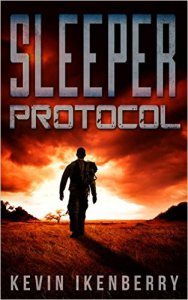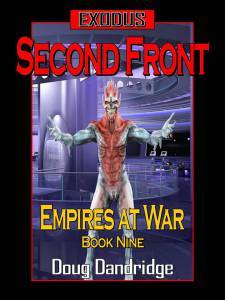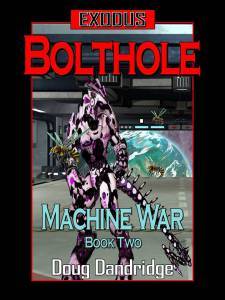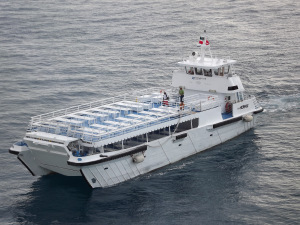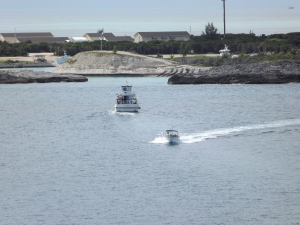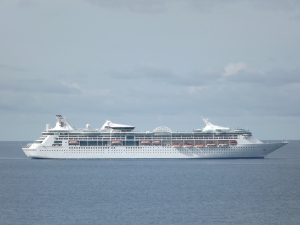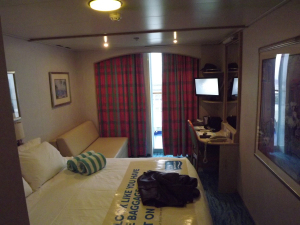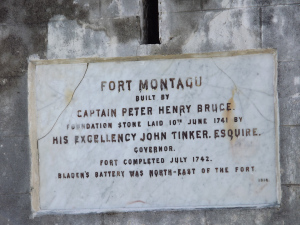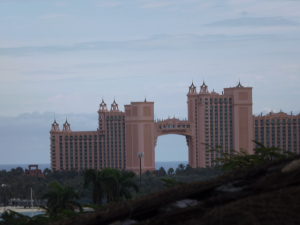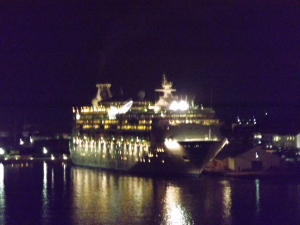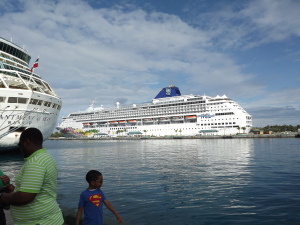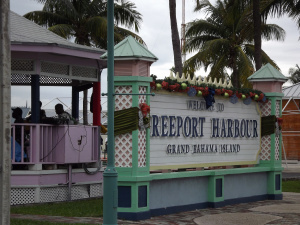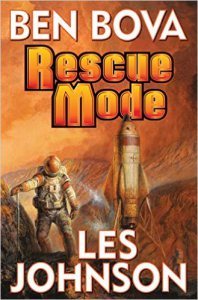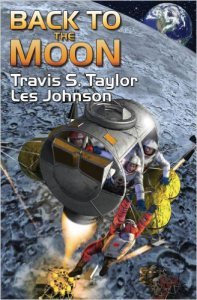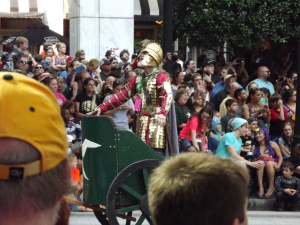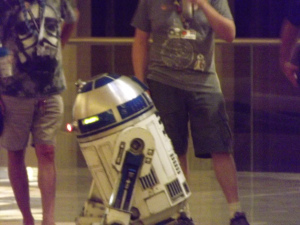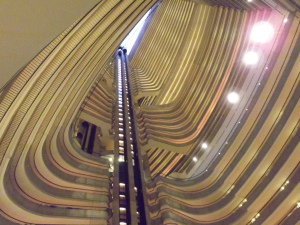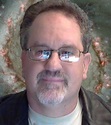Doug Dandridge's Blog, page 10
January 6, 2016
An Interview with Kevin Ikenberry and the Release of his New Novel, Sleeper Protocol.
My friend Kevin Ikenberry has just published a new novel, and I thought I would put this information out there. I met Kevin at Superstars Writing Seminar in 2014. He was a Major in Army Space Command at that time, and has since been promoted to Lt. Colonel and retired from active service. He returned to superstars in 2015, and I decided at that time that we must have some of the same interests as we had both requested the same guest to sit with at the VIP dinner (Eric Flint in 2014, Toni Weisskopf in 2015. Last year I learned that he had been a armor company commander in Iraq before growing up (his own words) and entering Space Command. His book, Sleeper Protocol, can be purchased at Amazon, among other retailers. So, without further adieu, here is the interview that Kevin completed with Pete Aldin.
An Interview with Kevin Ikenberry, author of Sleeper Protocol
Coming January 5, 2016
By Pete Aldin
1 . What are the origins of Sleeper Protocol?
I first wrote Sleeper Protocol as a short story entitled “Walkabout.” It was about 8,000 words and focused on a particularly bleak scene where my characters “leave” civilization and enter the frontier that’s become the central United States. When I sat down to outline the book, I wrote an opening scene where the protagonist wakes up on the shores of Sydney Harbor at a place called Mrs. McQuarrie’s Chair. I spent three and a half weeks in Australia when I was seventeen and I tell people all the time that I left a piece of my heart there. Having this book begin and end in Australia just felt right, so to speak. As for experiences, there are a ton of them in this book that I’ve tried to write in. Living in Colorado and hiking frequently gave rise to a lot of the narrative. Near the end, the action takes place in Tennessee where I call home (even after not living there in almost twenty-five years.). Where the culmination of the journey comes together is at my family’s “ancestral” home. We call it “The Farm”and I remember tearing up the first time I wrote that scene and the following one as well. The concept of him piecing together his memory from experiences is the critical element to the story – so bringing a lot of my own experiences into his point of view was challenging, but a lot of fun.
2 . Why are you a writer?
I can tell you that I am not one of those folks who say they wanted to be a writer their whole life. I wanted (and still would go tomorrow!) to be an astronaut. My decision to start writing science fiction in 2009 came, in large part, from my extensive background in space science education. Through teaching, I’ve been able to share my love for space with kids of all ages. Writing science fiction seemed like a natural progression of that love. The idea that I could write stories and potentially novels seemed very far out there when I started, but now I know that I enjoy telling stories and I can’t see not writing. When I first had a character start talking to me, I had no idea what to do other than start to write. With the help of a great instructor, I found great friends and mentors as I delved into writing. I’m glad that I did.
3 . What was the greatest hurdle to overcome in completing this project?
I finished the original first draft of Sleeper Protocol in late 2013 and decided to let it sit in the drawer for a few months before I went back to the manuscript. After a rewrite pass in September 2013, I decided to focus on a couple of other projects with the intent that I would return to Sleeper Protocol in March 2014 for a final polish and submittal. That’s when life got in the way.
In February 2014, I nearly died from an infection that attacked the skin on my right leg, shut down my kidneys, and put my heart in serious condition. After ten days in the hospital, I went home for a prolonged at-home care period. This should have been a blessing – a writer always wants more time to write and I had all I could handle. The problem was that I couldn’t write. I could barely do anything besides look out the window and try to come to grips with what had happened. After a couple of weeks, I reached out to Clarkesworld editor Neil Clarke who survived a massive heart attack three and a half years ago. Neil’s friendship and advice helped me get back to writing. In May of 2014, I started that final polish on Sleeper Protocol for submittal. Without Neil’s counsel and my team of beta readers, I might not have been able to make that happen.
4 . As a writer, with a full time job and a family, how do you manage to get the work done?
In all honesty, there are a lot of late nights. Being a night owl when it comes to writing is a good thing. After our kids go to bed, I have the chance to work on my writing. Some times are better than others, but it’s just a question of dedication. There are so many people who say, “I could write a book if I just had time.” My response to them is to get busy writing. The only way I’m able to tell stories is to sit down and get them out of my head. It’s a question of dedication and discipline. If the story matters that much to you, you’ll find a way to get it down on paper or into the computer. That’s what I focus on. If you really want to do something, nothing can stop you.
5 . What tips from your road to publication can you offer other writers?
Sleeper Protocol received an offer from a different publisher before Red Adept Publishing signed it. I turned down that original contract because I’d taken the time to consult with mentors. My biggest tip to anyone who will listen is simply to reach out to someone else if you don’t understand something. I know it’s not easy to do so, but in my experience, I’ve never had someone that I reached out to completely reject me. Writers, as a unit, understand that we are all in this together and everyone I’ve ever approached is willing to share their experiences. In this particular case, I asked two NYT bestselling authors to review the contract because it didn’t seem right to me, and it wasn’t right. Because I was brave enough to reach out, and they took the time to look over a bad contract, I saved myself a lot of trouble. If you don’t know – ask. Ask me, ask some one in your writing group, post a question on social media – there are a lot of people who’ve learned their lessons who will make sure you don’t have to do the same.
6 . With which of your characters do you most connect? Least connect?
Obviously, Kieran and I are very similar and while you might think that was very easy to write, there were times it was very difficult to put myself out of the equation and tell the story from the perspective of this character that is a lot like me but not me at the same time. Likewise, I can honestly tell you that writing from Berkeley’s perspective was very challenging. Connecting to my characters was really easy, mainly because they’d been talking to me for a couple of months before I started writing the original draft. All of them changed through the course of the drafts. Making connect to the reader is my greatest hope – I think I’ve done that.
7 . What is your favorite book of 2015 and why?
This is such a difficult question because I am very behind on my reading lists. I will say this: the best two I’ve read so far are Clockwork Lives by Kevin J. Anderson and Neil Peart and The Martian by Andy Weir. Clockwork Lives is a beautiful sequel to the novel (and Rush album) Clockwork Angels. The attention to detail in the book is amazing, especially the print layout and design. It’s a beautiful book and a beautiful story.
The Martian is everything a space geek like me loves, and Mark Watney is a great character. Andy Weir’s ability to create a thrilling story around the actual science that will get humans to Mars (and live there) is astounding.
8 . Favorite paragraph from Sleeper Protocol:
From Chapter Six
I landed in Perth after sunset, following an “in-flight delay for orbital debris mitigation,” whatever that meant. The bright side was that instead of circling out over the ocean or something, we flew three complete orbits around the Earth. Given what I remembered about my childhood and wanting to travel in space, I should have been thrilled. By my standards, or those from my time, I was an astronaut. The reality was that I dozed for most of the trip. The view of Earth from orbit met every expectation, but the tranquility of it lulled me to sleep after just a few minutes. Because of the late arrival, I caught the last maglev train to Esperance and stepped out of the terminus to a pitch- black night and torrential rain. The briny smell of the ocean floated on the strong breeze, and it made me smile. The lights of the modest town lay below me, down a slope of no more than a few hundred feet, and its warmth filled me. There were no buildings taller than a few stories and not much light compared to downtown Sydney, which was at once disconcerting and comforting. Lightning flashed out to sea and lit the rough, curving coastline for a split second. All of it was perfect. I wondered what it meant to feel so at peace in a place that I’d never seen in my life. I could be happy here. I walked in the rain without a jacket, and my coveralls were soaked through in a matter of minutes. Finding food and dry clothing would be high priorities eventually but not yet. The cool rain hammered my skin and washed the last bit of the Integration Center’s smell from my clothes.
9. What’s next for Kevin Ikenberry?
I’ve just concluded the first draft of Vendetta Protocol, the sequel to Sleeper Protocol. While I’m letting it rest, I’m gearing up for the release of my military science fiction novel Runs In The Family from Strigidae Publishing in the spring of 2016. I have another novel in discussions right now with my publisher. I’m working on a variety of projects and staying very busy. Hopefully, I’ll just keep on writing stories. That’s the plan.
Book Trailer: https://youtu.be/rw-43aahrZ4
Goodreads Link: https://www.goodreads.com/book/show/26200391-sleeper-protocol
Publisher’s Title Page: http://redadeptpublishing.com/#!/Sleeper-Protocol-by-Kevin-Ikenberry/p/54142069/category=12029350
Filed under: Conferences, eBooks, Guest Blog, Military, science Fiction, Writing Tagged: Amazon, Kevin Ikenberry, Kevin J Anderson, Space Command, Superstars Writing Seminar


January 3, 2016
The Start of the Self-published Fifth Year and Plans For The Future.
As some of you may know from past posts, I put my first two books up on Amazon and Smashwords on December 31, 2011. The first eight months were not very impressive, as I believe I sold about forty eBooks during that time. Then I did the giveaway of The Deep Dark Well, to the tune of over 4,000 copies. Two months later I published Exodus: Empires at War: Book 1, and it started selling well. How well? Over a hundred copies in October, 872 in November, 1,976 in December and 3,088 in January. I released Exodus Book 2 in December, 2011, and sold 1,440 copies that first month. In January of 2012 I sold a total of 8,560 eBooks, and that was when I decided I would do this thing full time in the near future. By the middle of March, 2012 I quit my job and I was suddenly my own boss. So, four years after putting up those first two books, I have sold over 151,000 Ebooks, 1,500 paperbacks, and 4,300 audiobooks, for a grand total of almost 157,000 copies. Six of the Exodus books have hit number 1 in Space Opera or Military Scifi on Amazon.UK, and top 10 on Amazon.US, with one reaching number 2. My total Amazon reviews total over 2,200, with an overall average across all books of 4.6 stars. On Goodreads I have over 2,300 ratings, with a 4.09 star average (4.18 for the Exodus series). We won’t get into money, except to say that I am making a very comfortable midlist (old midlist that is to say) income. So, everything is going well. I would like to do even better. I think most writers would. With the averages of my ratings on Amazon and Goodreads I think I can attract a bigger audience. The trick is actually doing it.
On New Year’s Day I posted that I was going to try for 3K words a day. Then I came down with bronchitis, and have been lucky to average 2K. But I believe the 3K average will come when I’m feeling better. That comes out to about 1.095 million words for the year, or just about nine of the 120,000 word novels I tend to write. It will probably be more like 7 books, and the rest in short stories, blogs, whatever. I have other series in mind, things I would like to work on, but first I need to finish what I started. So, future plans?
Exodus is still the primary focus. I am up to book 9 of the main storyline now. Some have commented that it’s already too long and needs to be finished. The majority opinion is that I can’t do too many books, but I have to disagree with that as well. I am planning a total of twenty books in the main series. Exodus was envisioned as a long series about a grand scale war. Some have said it appears to be World War 2 in space, which it kind of is, but not completely. Being an epic war, I wanted it to have a grand sweep, with successes and failures, advances and retreats, all the things that make up a grand war. While technology advances on both sides, there are no miraculous superweapons that win it overnight. Twenty should get me there, and there will be at least three books in the main storyline in the coming year, with the first release planned for March. Machine War, the side series, is also doing well, though not in the same league as the main storyline. One of the reasons for releasing that series while the main one still progressing was to have continuity between the two lines, without one already having given away the game of the other. There will be at least one book in Machine War released in 2016, and a total of six in the series. I will also put out a book or two of Tales of the Empire, with the first due for release in about two weeks. I like these short story and novelette collections because not only are they fun to write, they are good practice for writing short fiction. There will be some Tales of the Empire standalone novels as well, covering the history of the Empire. I will also write book 5 of the Refuge series, closing in on the finish. I expect 6 books will complete it. This was a series I had great hopes for, but it just isn’t doing it. Maybe some time in the future I can restart it.
In two weeks I will be releasing the first book of the second Deep Dark Well trilogy. I wrote this book back in 2011, prior to releasing my first self pubbed work. I love the storyline, and it opens up an entirely new Universe with endless possibilities. I will probably release a book a year until the trilogy is finished, then see what happens. I have two short stories for invitation only anthologies I need to submit by January 31st, and another two for additional invitation only anthologies in May. And at least one, maybe two, novel submissions for traditional publishers. Now, several popular traditionally published authors have asked me why I would want a publishing contract. The answer is to get more readers. I would like to lock in a series with preferably Baen, do a book a year for them, maybe two, and spend the rest of the time putting out self pubbed. I think I can make it work to the mutual advantage of the publisher and myself.
I have more series in mind for the future. I love the Exodus series, and it has done very well, but it also shows a lot of the things early on that I didn’t know. I hope to avoid the same mistakes in the future. Still, there will be another Exodus series, starting with the contact with the Ca’cadasans and the flight of humanity, up to the establishment of the Empire. I have several space opera series in mind, a standalone sublight warfare novel, possibly an urban fantasy, some alternate history, and a solar system warfare series. And maybe some military post-apocalyptic stuff. I’m not sure when I’ll do these other projects, or even if I will survive long enough to get all of this out. What I do know is I won’t run out of stuff to do.
Filed under: Alien Invasion, Alien Life, eBooks, Fantasy, Far Future, Future Warfare, Intelligent Life, Kindle, Military, Near Future, Plotting, Proofreading, Robots, science Fiction, self publishing, Space Navy, Titles, Tropes, Uncategorized, Wormholes, Writing Tagged: alternate history, Amazon, Exodus: Empires at War, Exodus: Machine War, goodreads, midlist, Refuge, The Deep Dark Well, Theocracy


December 29, 2015
Sail to Success: A Unique Writer’s Workshop, Part 3.
Thursday was the last day of the workshop. I woke up that morning to the usual sounds of something going on that I had associated with the ship docking. Only this time when I went to my balcony, I saw that we were still on the water, and a large square boat was tied up alongside. And another cruise ship maybe four hundred yards off of ours. We were at Great Stirrup Cay, a small island owned by Norwegian lines. There really wasn’t anything there but a store and beach. Since I had a meeting with Mike Resnick at noon this day, and the workshop afterwards, I decided to pass on the Island. Breakfast on the back deck offered a view of the island and another nearby, as well as the other cruise ship. Soon people were para-sailing near the other ship, and the boats were going back and forth from the Sky to the shore.
At noon I met Mike Resnick in the dining room. I wasn’t really hungry, having just eaten breakfast a couple of hours before. We sat at a small table and had a very nice, casual conversation about books, movies, my career, you name it. We talked for about an hour, and when Mike was ready to leave, and I told him I need to grab a quick bite, he volunteered to stay while I ate, so I got not only more than the fifteen minutes promised, but well over an hour. For those who aren’t familiar with Mike Resnick, he is considered the most awarded science fiction writer of all time. The winner of five Hugos, he related a story on one of the panels on how he had thirty-seven nominations, and that his thirty-two losses made him the losingest Hugo of all time nominee as well. I started reading him when I was still a kid, and was now talking with him as I closed in on sixty.
Mike asked me about my goals, including if I really wanted to become traditionally published as I was doing so well as an indie. So we talked publishing, books, famous writers and movies for the hour. Asked how he felt about Forbidden Planet and was delighted to know that he thought it was a great movie (while he doesn’t think much of most scifi movies). An hour of talking to someone who had lived so much of science fiction writing history was almost worth the price of the workshop itself.
At 1:30 PM was the second part of the Manuscript Critique with Nancy Kress. Again, close attention needed to be paid to get the perspective of this writer on the submissions. Next up was Eric Flint, talking about how to write for his 1632 Universe, which opened up another opportunity for submissions in the future. Dinner on the rear deck came with a view of the Great Stirrup Cay and nearby islands fading into the distance in the darkness. After dinner were the sessions Sharpening Prose and What Kind of Writer Do You Want To Be. The last session was the entire faculty relating their funniest publishing stories. And at 10 PM it was all over and I was exhausted.
The last morning on the ship was waking to the Sky tied up at the dock in Miami we had left from at the beginning of the week. I decided to keep my bags with me on exiting the ship, so after breakfast I went through the disembarkation procedure and Customs, which was actually relatively quick and painless. What wasn’t so painless was the drive home, eight hours on the road to Tallahassee while still really tired.
So, what were my final impressions of Sail to Success 2016, and how did it compare to other workshops I had been to? I thought it was an excellent workshop and overall experience. The faculty was world class, open and knowledgeable. It wasn’t cheap, but then again, neither were most of the other workshops and seminars I had attended. How did it measure up?
The first workshop I ever attended was Jody Lynn Nye’s Intensive Writer’s Workshop at Dragon Con, which I would recommend to anyone who has never been to a workshop. Or to anyone who wants to improve their craft and attend a gigantic con. It was reasonably priced, and part of a larger experience. I made my first live contacts with others in the profession. There was a manuscript critique. I think anyone starting out who is within driving distance of Atlanta should attend Dragon Con and this workshop. Jody, and her husband Bill Fawcett, also do a one hour workshop at Liberty Con some years.
Superstars was the second conference/workshop I ever attended, and was, after hotels, flights, and fees were considered, about in the same price range for this writer as the cruise. It featured world class faculty and interesting and informative instruction. It also had a VIP dinner that allowed the student to have a conversation with one of the faculty members. I sat with Eric Flint one Superstars, with Toni Weisskopf the next. Kevin always makes this a great experience. Definitely worth the price, and enjoyable enough that I went twice. I would attend this year, but it’s time to look at some other opportunities.
David Farland’s (Dave Wolverton) one day workshop, Greenlighting Your Novel, was a one day affair, within driving distance. While a more specialized workshop than the others I have attended, it was well worth the price. Dave is a great instructor with a lot of knowledge of the publishing and movie industries. When another reaches my neck of the woods, I will probably attend.
Dean Wesley Smith and Kristine Kathryn Rusch’s Workshop on the Coast was also expensive, with flights to Oregon, a hotel for the what amounted to nine day stay, and the workshop fee. You get to interact with six different editors, including two lunches during the week with two of the faculty members. To this writer it seemed a little too much, six days of constant manuscript critiques that seemed to beat me down. Still, the information about what editors want is there, and if you are interested in doing a lot of short fiction submissions this is a great workshop, which also offers the opportunity to sell some stories to the anthologies that come out of the workshop. And for the right kind of person, this seems like the ideal workshop, since many attendees come back year after year. Just be sure you have a thick skin, and are far enough in your writing to have a chance.
Sail for Success was also expensive. It also offered world class faculty in a unique surrounding (A flippen 70,000 ton plus ship). It included manuscript critiques and the chance to interact with the faculty. I consider it up there with Superstars for the best workshop/seminar. I doubt I will go again next year, but maybe some time in the future.
Filed under: Agents, Conferences, eBooks, Fantasy, Kindle, Plotting, science Fiction, self publishing, Titles, Tropes, Writing Tagged: Bill Fawcett, David Farland, Dean Wesley Smith, Eric Flint, Jody Lynn Nye, Kevin J Anderson, Kristine Kathryn Rusch, Mike Resnick, Nancy Kress, Sail to Success, Superstars Writing Seminar


December 26, 2015
Sail to Success: A Unique Writer’s Workshop, Part 2.
As related in part 1 of this blog, Sail to Success was a small group writer’s workshop with world class faculty, including Mike Resnick, Nancy Kress and Eric Flint, all leaders in the science fiction field. Advertised as a Unique Writer’s Workshop, it took place on the Norwegian Cruise Lines vessel Norwegian Sky, sailing the Bahamas. Each night we went to bed to wake up at a different island. Kind of like being in a hotel that changed cities during the night. What a cool scifi theme, reminiscent of Larry Niven’s transfer booths. Night two on the ship was much better than the first, when the seas were kind of rough, and walking was an adventure. Even standing still made one feel drunk. The ocean was much smoother, and the decks of the ship felt almost like dry land. So that night I slept well, my alarm set for 7:30 AM on a day when we were scheduled to arrive at 8 AM. I was woken by the sounds of the ship tying up at the dock, and I went to my balcony to get my first look at Nassau. This time and place the dock was right at the waterfront of the targt city, downtown Nassau. Later, looking at the map, I realized that Nassau island was really one big city, and there would be very few places anything could tie up where it wasn’t city. The dock looked like it could handle three ships, and there was another on the tie-up closest to the shore. Another large cruise ship, similar to ours, but different in many ways.
Again, I had breakfast on the rear deck of the ship where the buffet was served. Looking out on the water I was reminded of where I grew up in Florida. Beach houses, water everywhere, many boats on that water. One thing I noticed in my home town was the recent absence of seagulls. Well, they seemed to have all moved here, and I learned a lesson when I left my plate on the table to go and fetch some coffee. And the seagulls, like those in the movie, The Birds, descended on my food in a feeding frenzy. I tried to shoo them off to the laughter of the other diners. So, it was get another plate of food and a cup of coffee and guard it while eating.
As at Freeport, I went ashore with the intention of looking in a few shops and coming back to the ship. Instead, I was marked by a man who set up people with tours and next thing I knew I was waiting for a group to form. I had a meeting with Nancy Kress at noon, and I didn’t want to be late, so I asked several times when the tour would be over. Finally, we started out and headed across the bridge to the Atlantis Resort, where we were dropped off for a half an hour. After the tour started I again pestered the guide/driver to make sure I would be back at the ship on time, and was assured that we would be. So I sat back and tried to enjoy the tour of beautiful Nassau. Forts, old buildings, botanical wonders. It is a beautiful city, and I wish I had had more time to look it over. Still, it was a cool little tour, and I‘m surprised the guide didn’t drop me at the police station, since my writer’s brain was working on a storyline involving taking an island city by force. I was strong armed into buying a hat and shirt, and only got away when I ran out of cash. Despite asking questions like a spy, she dropped me off at the ship with fifteen minutes to spare, where I made my way to the buffet deck to wait for Ms. Kress. I finally saw her at 12:30, and was informed that we were supposed to meet in the library next to the meeting room. Unfortunately, I do tend to write sparse notes and depend on my failing memory to fill in the gaps, and I had only written Nancy at 12. She graciously set up a meeting at 3 PM during a break.
So we started our sessions at 1:30 PM, with some break time built in. I met with Nancy at 3, and we had coffee and talked for a half an hour. It was fun talking with the woman whose late husband had been such a great influence on me sticking to staying the course, as well as conversation with an award winning author in her own right. We talked about some of her stories, some of my career goals, just a comfortable chat to help me to learn from her perspective about the publishing industry. Yet one more cool thing about this cruise, sort of like the VIP dinner at Superstars.
Most of the day was taken up with panels, mostly dealing with professionalism, productivity, query letters and contracts, property rights, and working with agents, publishers and editors. All interesting topics, since I am interested in eventually pursuing a hybrid career of traditional and self-publishing, and I seem to have the self-publishing thing down pat. One of the most attractive things about this kind of learning environment is the honesty. No one there is trying to sell you on a certain publisher or editor. They will tell you of their experiences, good and bad, in an effort to keep the students from making the same mistakes. Again, similar to Superstars.
Dinner was accompanied by the ship leaving dock and heading out, and I sat for an hour on the rear deck watching the lights of the island recede into the distance. I could spend a week watching the island slowly move away as the ship was gently churning its way through the water. But time ticked on, and panels and sessions beckoned, and so I bid Nassau farewell and headed up to the meeting room.
Jim Mintz did the second half of his manuscript critique, which also included handing out a manuscript to the student that had been critiqued by Toni Weisskopf. This night was no stress, since both Jim and Nancy’s critiques of my manuscripts had been done on the first night of feedback. Still, there were things to learn, especially if you were interested in the opinions of people who either wrote award winning stories or have bought or rejected thousands of manuscripts through their career.
And then that day was over, and I staggered back to my room to shower and bed.
Next up: Part 3, Great Stirrup Cay, Miami and Wrapup.
Filed under: Agents, Charles Sheffield, Conferences, eBooks, Fantasy, Plotting, Proofreading, science Fiction, self publishing Tagged: Eleanor Wood, Eric Flint, Mike Resnick, Nancy Kress, Sail to Success, Shahid Mahmud, Superstars Writing Seminar, Traditional publishing


December 16, 2015
Sail to Success: A Unique Writer’s Workshop, Part 1.
I recently went on the Sail to Success Workshop Cruise. It was a fascinating experience, one I would recommend to any author looking to improve their game. I have to admit that I was, through good fortune, well ahead of most of the other writers at the workshop, but I still learned a lot, as well as having the doors to some new opportunities opened. I first heard of this cruise through my friend Kevin J Anderson at Superstars, when I asked him if there were any other workshop/seminars he could recommend. I signed up for it on the internet while still in Colorado, and was disappointed when it was cancelled due to lack of participation. I signed up for it again this year, and fortunately they had enough sign ups this year to actually schedule the cruise. I would definitely put it up there with Superstars both in the quality of the faculty and the depth of the material covered. And the level of exhaustion afterwards.
I was hoping that Toni Weisskopf would be aboard, but she had to cancel. It was important to me to get some of my work in front of a Baen editor, and Toni is also the publisher. Fortunately Senior Editor Jim Mintz was able to take her place, and we were able to get two manuscript reviews from Baen, as well as one from Hugo Award Winner Nancy Kress. It was an expensive workshop, partially due to being a cruise, but also factoring in travel and the hotel in Miami the night before to make sure nothing came up to derail those travel plans. And pet care, both sitting for the cats and kenneling for the dog. I couldn’t have afforded the workshop prior to becoming a full time author, but then again, I couldn’t afford Superstars or Dragon Con either. It is an investment, and if I had known some of the things I know now about publishing, I would have come up with the money somehow. But more on that later.
On the day before the cruise I got up and started getting everything together, only to discover that my passport, the location of which I had known for over a year until that morning, was missing. Panic ensued, until I found it where I had placed it so it would be easy to find. Still got off in time and drove the almost eight hours to Miami. I chose a hotel, the Holiday Inn, that was close to the Port of Miami, just in case I got lost the next day. It was actually easy to get to the port the next day, and in less than an hour I was on the Norwegian Sky. Not the largest cruise liner in the world, merely greater the displacement of the Titanic. There was a wait for the staterooms to be ready, but they were serving lunch, so all was well. I finally got into my room, which was small but comfortable enough, and had its own balcony. An hour later the alert for an abandon ship drill sounded. I stumbled out of the bed and found the life preserver, then looked into the hall to find that no one was responding to the alert. I put the life preserver back in my room and went down to deck 6, where the lifeboats were stored, to find absolutely nothing going on. I went back to my room, just in time to hear the intercom blaring that there was indeed a drill, and I headed back to the assembly area, where people started coming in slowly over time. At least I knew I would be one of the first on a lifeboat if it had been real.
The ship sailed at 5 PM, and I sat first on my balcony, taking in the sights of Miami, then headed up to the buffet and ate on the stern deck to see some more of the city. Miami is a pretty city, with modern buildings and lots of lights. Unfortunately, a lot of those lights were from massive waves of traffic. No thanks. I’ll keep Tallahassee or smaller cities to live in. We cruised through the channel between Miami and Miami Beach and soon turned out to sea. The first night the seas were a little rough. It had been raining most of the day in Miami, and the weather in the Bahamas was supposed to be the same. Weather is not something they could promise. Walking the ship that night was almost like being drunk, as it pitched in seas that really didn’t seem that high, not compared to the North Sea that I had travelled across in a ferry while in the Army. Still, it was another experience, and I was constantly observing everything aboard the ship, filing away information that I might be able to use in future stories, such as the size of the staterooms and bathrooms, or of the entertainment facilities. Things I would consider useful to know when designing a spaceship.
That evening at 6:30 PM the workshop started with registration and introductions. We were introduced to the faculty and the other eleven people who were attending. One student I had met at Jody Lynn Nye’s workshop at Dragon Con 2013, and again at Liberty Con 2014. Two others had been attendees of Superstars. The faculty included Eric Flint, one of Baen’s lead authors, and also a regular at Superstars. Nancy Kress is a multiple Hugo winner, and her late husband Charles Sheffield was one of my first online mentors when I started writing. Mike Resnick is the all-time award winner in science fiction (though he also told the story of being the all-time loser of Hugos, with five wins and thirty-two losses). Jim Mintz is a senior editor at Baen books, and I had met him at Dragon Con 2013 and talked with him at several Dragon and Liberty Cons. Eleanor Wood is the senior agent at Spectrum Literary, and represents Mike Resnick. Author Jack Skillingstead rounded out the faculty, which gives six instructors to twelve students. I don’t know if that is the cutoff or if they had more space, but because of the critiques given by Nancy and Jim, I doubt they could have had too many more added to the class. Shahid Mahmud is the publisher of Arc Manor, which put on the workshop. After introductions they jumped right into classes on the publishing business and character building.
We broke up at 9:30 PM. I went to the stateroom of one of Mike’s friends, and stayed there talking with the friend, his wife, and Eleanor Wood. Back to my room at midnight, I crawled into bed, waking up at 8:00 to the sights and sounds of the ship tying up to the dock in Freeport. Freeport docks are actually a little distance from the town, and since we only had the morning free, I just visited the tourist traps next to the docks. Living in Florida most of my life, you would have thought I would have visited one of our closest neighbors before this, but I finally stepped ashore in this country and added it to my list.
Classes started that day at 1:30 PM, with part one of the manuscript critiques by Nancy. She went alphabetically, and I was first up, which is really the best position to be in, since you don’t have to worry about it from then on. I was asked to sit on the indie publishing panel at 4, something else to add to my resume’ when approaching conventions. We broke two hours for dinner, then we had the first manuscript technique with Jim. He didn’t’ go alphabetically, yet I still went first, go figure. But after that I had no stressors about that part of the workshop. After the critique session were two classes on working with magazines and getting through the magazine slush pile. This is where I found out I had been doing it all wrong. Part of the process is getting to know editors and publishers by attending conventions and workshops. I didn’t start doing this until I was already selling online, so it worked out for me, but it would have been nice to know earlier. Now it is information I can use to push on to the next level. We broke at eleven, and I was again very tired, and crawled off to my room to wind down, then into bed.
Next up: Part 2, Nassau.
Filed under: Agents, Charles Sheffield, Conferences, eBooks, Fantasy, Plotting, science Fiction, self publishing, Writing Tagged: Arc Manor, Bahamas, Eleanor Wood, Eric Flint, Freeport, Jack Skillingstead, Jim Mintz, Kevin J Anderson, Mike Resnick, Nancy Kress, Shahid Mahmud, Superstars Writing Seminar


December 4, 2015
Review of The Beast of Mysore
In the past several years I have been asked by several authors if I would read one of their books and post a review. Mostly this was from friends, or friends of friends, and I was talked into reading a book that I really wasn’t interested in. And invariably these were bad books. Not bad stories, not horribly unimaginative. Some were great story ideas, executed well, with imaginative characters and settings. So, what was wrong? In a word, errors. Most people can handle some errors in a book, whether it be typos or grammar, or simply confusing sentence construction. This is not just a feature of independent books. I see enough of them in traditionally published works as well. My books have some, but I don’t think they are any more mistake prone than many traditionally published books by well know authors. But most of these books I agreed to review had so many errors, up to several a page (in one case five or more each page), that I couldn’t finish them. One I reviewed some years ago (I had promised to give an honest review, and warned the author that was what he was going to get at the end, hoping he would say forget it) had the villain’s name spelled four different ways in one chapter. Now, what these people really wanted was a five star review from an Amazon bestseller, but I wasn’t willing to give one based on their effort. I want to have some trust and credibility with my readers. The authors want me to pass on some of my success to them, though I’m not really sure how that works. Since I am not in this business to make enemies, I will not do a review. And have basically given up on doing reviews of unknown authors, since I really don’t have the time.
So what was different about Richard Estep’s The Beast of Mysore: Wellington Undead, Book 1? Well, I have always been a big fan of the Duke of Wellington, in my opinion one of history’s great military leaders. I have also read the entire Sharpe’s series by Bernard Cornwell. And the way Richard presented this book, with the leadership of the European nations consisting of vampires, a new idea, caught my attention. These are not the hide in the dark (though they still can’t come out in the day) bloodsuckers of most fiction. Because of their abilities; strength, speed, longevity, they are superior to mortals, and so have risen to the heights of their societies. Kings, dukes, generals, on down to captains and such, these are the leaders of Europe during the Napoleonic wars. Vampires are not only the leadership, but are also force multipliers on the battlefield. Nothing like an officer with super strength and speed swinging a sword at the point of the attack to achieve a breakthrough.
What I liked most about his vampires was they were not only creatures of the night, with essentially evil dispositions, but were also King’s officers, honorable men who take their oaths seriously. And as hard to kill as they are, they are nowhere near invulnerable. They can be killed, in the most painful manner imaginable, and they are willing to sacrifice their immortality in service to the King. No cowards these, hiding during the day and only striking at the helpless.
And the opponent, the Beast of Mysore, the Sultan, is just as powerful in a very different way. He is obsessed with tigers, for good reason it turns out, and his personal guard has its own supernatural abilities. It’s a clash of cultures, both natural and supernatural, and Estep does a great job of using both the strengths and weaknesses of his characters in his stories. The battle scenes are well done, and reminded me much of Cornwell’s Sharpe series.
After reading the book Estep not only got a review and a blog, but he gained a fan. I want to read more of this series. Fortunately, he already has a book 2 out, with 3 coming in the near future. I highly recommend this series, both for fans of the supernatural and of historical fiction. Will the fans of my space opera like this work? I know that many of my readers like their fiction in one or the other genres, and this series is definitely cross genre. But since the military action is first rate, I think even the people who despise fantasy might find this series an enjoyable read. It’s definitely worth a look. You can get it here.
Filed under: Blog Tour, eBooks, Fantasy, History, Kindle, Magic, self publishing, Tropes, Typos, Undead, Vampires Tagged: Bernard Cornwell, Duke of Wellington, India, Mysore, Napoleonic Wars, Richard Estep


October 23, 2015
Here is my interview with Doug Dandridge
Double blog day, with my guest blog on Authorinterviews.
 Originally posted on authorsinterviews:
Originally posted on authorsinterviews:
 Name Doug Dandridge
Name Doug Dandridge
Age 58
Where are you from Born and raised in Venice, Florida on the west coast of the state.
A little about your self `ie your education Family life etc
I was raised by a Native Floridian father and a Mom from Long Island, New York (her family was French Canadian). Went to Catholic school, then the local high school and participated in Marine JROTC. Joined the US Army after graduation (infantry) and served four years, plus two in the Florida National Guard. Went to college at Florida State, and spent ten years and four majors (biology, geology, biology education and psychology) in and out of college before getting my degree, then on to graduate school in Clinical Psychology at the University of Alabama.
Fiona: Tell us your latest news?
My first Exodus novel, which has sold almost 23,000 copies in eBook and Audio, is…
View original 3,342 more words
Filed under: Uncategorized


Exodus: Machine War: Book 2: Bolthole is here.
I released Exodus: Machine War: Book 2: Bolthole on Wednesday night to Amazon, which meant it was up for sale by early Thursday morning. The second book in the spinoff series, this volume deals more with the death machines built by the humans three centuries before that had gone beyond their programming, to kill the enemies of the Empire, to the much broader mandate of kill all life. I loved being able to put out this series, but from the comments and reviews of both the first book, and soon after the release of this book, not everyone agrees. I think Bolthole is one of the best novels I have ever written, filled with action, chock full of life or death situations. The machines are not as advanced as the current Empire, but have several advantages, such as not having to worry about the effects of inertia on frail organic passengers. They can brute force a lot of weapons that Imperial ships simply don’t have the space for.
Supernova was really a book intended to introduce another species I felt was vital to the war effort without just saying that they were found under a rock. The machine aspect introduced itself to my imagination about halfway through the first draft, and I ran with it from there. I had wanted to explore the old scifi trope of the civilization threatened with extinction by a supernova, an idea that seemed out of date now that we know that blue giant stars are very short lived, and don’t possess a half dozen habitable planets in their life zones as once thought. The idea of having a blue giant near enough to threaten a more standard solar system was one I couldn’t resist.
One comment on the first book was that most authors finish a series before they start a new one. I love reading David Weber, for all the faults of his writing he tells entertaining stories. David has Honor Harrington as well as several Honorverse side series, Safehold, and some stand alones. I’m prolific, and I have no idea how he puts out so much. But it made sense to get the second series going while the first was still doing well. There were ideas I wanted to explore in the Exodus Universe that would run concurrently with the main storyline, and I couldn’t see any other way of doing those stories in the future. Storylines could give away aspects of other storylines. For example, if I finished out the Empires at War storyline, then all of my readers would know that whoever survived that narrative would be in no danger in the Machine War tract. The other factor has to do with coming up with new ideas. I have received reviews that pointed out how the Empires at War series keeps getting better, with fresh ideas in each volume. One of the common tropes of writing is that ideas are easy to come by. This is partially true. I have enough ideas to write a hundred books if given the time to complete them. But not in the Exodus series. New ideas in a series that is now over a million words do not come all that easy, and two or three books a year are about all I can do now and keep up the quality. Machine War gives me another outlet to write in that Universe, and also helps to generate ideas that might not go into that series, but instead into Empires at War. If all I wanted to do was put out five Exodus books a year my income would double, but I would eventually run the series into the ground, which is something I don’t want to do.
I have other plans for the Exodus Universe. I will put out several more Tales of the Empire books. I have theme ideas for two or three more collections of novellas, and for a couple of stand alone novels. Two ideas are Constance, about the Admiral who revolted against a mad emperor and became empress, and The Chase of a Thousand Years, detailing the contact with the Cacas that led to the destruction of Earth and the thousand year run to a new start. I talked with an artist friend of mine at my class reunion, and I hope to have the Cacas I envisioned gracing the cover of a future Empires at War book. I also have some other books, including another Deep Dark Well novel that is a start to a second trilogy, that I wrote before I embarked on an independent career. And I am currently working on a submission for Baen books, and maybe some other publisher if they don’t like it. The plan is to become a hybrid, using the tradition avenue to grow readership for my independent works. As I told one fan recently, I intend to keep putting out the independent books in the same price range, but a traditionally published book can’t help but gain exposure. And then there are the Refuge books. I owe it to those readers to at least come to a closing point on that series, though I am also hoping that the new covers I have commissioned might breath some new life into a fantasy world that is close to my heart.
So Bolthole is out, and I hope my fans will enjoy it. Supernova didn’t sell as many copies as my recent Empires at War offerings, but still enough to make it worthwhile. And I plan to continue that series to a conclusion as well. If you are a fan, and Machine War isn’t one of your favorites, I hope you will stick with me through Empires at War. Thanks.
Filed under: Alien Invasion, Alien Life, Conferences, eBooks, Fantasy, Far Future, Future Prediciton, Future Warfare, Genetic Engineering, Intelligent Life, Kindle, Magic, Military, Plotting, Robots, science Fiction, self publishing, Space Navy, Titles, Tropes, Websites, Writing Tagged: Bolthole, David Weber, Exodus: Empires at War, Exodus: Machine War, Honorverse, Safehold, Supernova, The Deep Dark Well


September 29, 2015
Les Johnson: Physicist, NASA Scientist and Science Fiction Writer.
I met Les Johnson at Liberty Con 2014, where he was a guest scientist and author. I talked with him while getting a couple of his books signed. I remember asking him if he was going to quit his day job, something most authors dream of, and was surprised by the answer. Because to Les Johnson, NASA scientist, it was not just about the paycheck. He has a true calling, to help mankind to conquer first the solar system, then journey to the Stars. This year, at Dragon Con, Les stated during a presentation about solar sails that he wanted to get a footnote citation in the first textbook about the founding of the Alpha Centauri colony. Most authors want to get on the New York Times best seller list. Les wants to really make history, for the benefit of humankind. You can meet Les at Liberty Con, Dragon Con or the Tennessee Valley Interstellar Workshop, where you will find a friendly guy who is enthusiastic about his work without the least shred of the arrogance often found among the very intelligent. He has contributed to the projects such as the National Geographic Documentary Evacuate Earth, and gives talks about space all over the country. An example is this TEDx talk. He has also written hard science fiction with Ben Bova and Travis Taylor.
Now most people who follow me know that I write fanciful far future science fiction. This allows me to make up my tech, my settings, and avoid a lot of the painstaking research that goes into travelling around our own system, where we know so much, and yet things are constantly changing as we learn more. Writing near future hard science fiction is hard. Bova specializes in this, and Les was a good choice for a co-author of Rescue Mode. Rescue mode follows an expedition to Mars that goes very wrong. Using the best information that we have today, Johnson and Bova craft a tale of explorers who have to make the hard decisions to survive disaster. And that’s all I’m going to say. Read the book. Back to the Moon is a tale of a rescue mission to the Moon. I have read both of these books. I normally read space opera, though I have read all of Bova’s Solar System series. Both of these books taught this author that you can still write a good story set on our closest neighbors. Both were highly entertaining as well as educational, and I can’t recommend them enough. The reason this blog is coming out today is that Rescue Mode is actually out in paperback today. So, for those who don’t like eBooks, and can’t afford hard covers, here you go.
And now, in Les’ own words, (which he asked me to say are his own and do not reflect those of his employer!), where will we be going next:
Moon or Mars?
That’s a question I am often asked regarding where we should send people when we are soon able to (again) travel beyond Earth orbit. Those who ask typically have their own idea of where that should be – and they are usually very passionate about it. Unfortunately, given the state of our technology, we are pretty much limited to the Moon, Mars or an asteroid.
The Moon: Going back to the Moon is probably the easiest, technically and financially. We’ve been to the Moon before and we know how to design the rockets to get us there and back. We’ve continued studying the Moon since Apollo and we know that it would be possible to establish a permanent human presence there if we want to do so. If we go back, then we can 1) erect radio telescopes on the lunar farside – the best place in the solar system for radio astronomy, 2) assess the viability of mining He3 for future Earth-based fusion energy production, 3) assess the Moon as a source of raw materials for building space solar power stations on the Moon or in Earth orbit, 4) learn to live and work off planet as a first step toward us becoming an interplanetary species.
Asteroids: If we want to develop a space-based economy, then we need to learn how to locate, mine and use the raw materials in Near-Earth asteroids. Asteroids are the left over building blocks of the planets and they contain all the raw materials we will need to sustain our technological civilization – hopefully (eventually) replacing Earth-based deep pit mining. Many elements that are rare on Earth are readily available in there. They can also be used as a source of raw materials for building space solar power stations.
Mars: The Holy Grail of human exploration has always been Mars. Wernher Von Braun cited it as his ultimate goal and people have dreamed of going there since we first began peering at the Red Planet through our telescopes. Getting to Mars will be difficult, but not impossible. NASA is building the Space Launch System (SLS) which, when combined with commercial launch of fuel and other elements, will easily loft the massive systems needed to carry humans to and from the surface of Mars. The technologies required to keep the crew alive in a deep space habitat exist. The systems for landing and launching from the surface of Mars can be made from today’s technologies as well. The astronauts can be protected from solar radiation during the voyage and there shouldn’t be a problem with the life support systems (thanks to years of development experience on the International Space Station). It will be expensive, but not prohibitively so.
But to make any of these exciting futures happen, we have to stop the bickering and infighting. The Moon advocates need to accept that we may go for Mars and skip the Moon for now. The Mars advocates may have to wait until after we establish a colony on the Moon. And the asteroid exploration supporters may have cool their heels until better technologies come along to make asteroid exploration and exploitation more economically viable. Lastly, the NASA bashers and the New Space critics need to learn how to support each other if we are ever going to become an interplanetary species. There are roles for both governments and commercial companies in the endeavor. We need to learn to stop fighting among ourselves and focus instead on making a positive future for humanity in space.
So what are you waiting for, Below are the links to Les’ work, both science fiction and science fact. Again, highly recommended by this author and science fiction fan.
My website: www.lesjohnsonauthor.com
Rescue Mode link: http://www.amazon.com/Rescue-Mode-Ben-Bova/dp/1476781036/ref=sr_1_1?ie=UTF8&qid=1442100908&sr=8-1&keywords=rescue+mode
Going Interstellar link: http://www.amazon.com/Going-Interstellar-Johnson/dp/1451637780/ref=sr_1_1?ie=UTF8&qid=1442100965&sr=8-1&keywords=going+interstellar
Back to the Moon link: http://www.amazon.com/Back-Moon-Travis-Taylor/dp/145163773X/ref=sr_1_1?ie=UTF8&qid=1442101085&sr=8-1&keywords=back+to+the+moon+taylor
Solar Sails: A Novel Approach to Interplanetary Travel link: http://www.amazon.com/Solar-Sails-Approach-Interplanetary-Springer/dp/1493909401/ref=sr_1_1?ie=UTF8&qid=1442101020&sr=8-1&keywords=solar+sails+a+novel+approach
Harvesting Space for a Greener Earth link: http://www.amazon.com/Harvesting-Space-Greener-Gregory-Matloff/dp/1461494257/ref=sr_1_1?ie=UTF8&qid=1442101047&sr=8-1&keywords=harvesting+space+for+a+greener+earth
Les Johnson is a Baen science fiction author, popular science writer, and NASA technologist. His most recent science fiction novel, Rescue Mode, is about the first human mission to Mars and was coauthored with Ben Bova. It will be released in paperback September 29, 2015. But don’t let that fool you into thinking Les is only thinking of going to Mars. His first novel, Back to the Moon, is a tale that Analog Magazine called, “a book to thrill.” His next novel, The Asteroid, will be released in 2016. To learn more about Les, please visit his website at www.lesjohnsonauthor.com.
Filed under: Blog Tour, eBooks, Future Prediciton, Near Future, science Fiction, Space Industry, Space Program, Uncategorized, Writing Tagged: Back to the Moon, Baen, Ben Bova, Evacuate Earth, Going Interstellar, Harvesting Space for a Greener Earth, Les Johnson, NASA, National Geographic, Rescue Mode, Solar Sails, Travis Taylor


September 23, 2015
Dragon Con 2015: I Came, I Saw, I Got The T-shirt: Final.
Monday morning came, the last day of Dragon Con. Every other con I had been to, all three of them, ended on Sunday. But Dragon, always held over Labor Day Weekend, had that extra day to offer. I was up early so I could get out of my room and still make some of the last panels. As usual, the lobby was almost empty at 8:30 AM, and the restaurant was as always uncrowded at that hour. Breakfast was kind of pricy at $26 for the buffet with coffee and juice. The omelets were masterworks as always, and the luxury of a sitdown meal without having to fight the crowd was worth it. Then it was up to my room to pack and get out of the hotel. The bill had been left under the door the night before, along with instructions on how to check out by phone or TV remote. Since I had no balance, everything having been charged, and had no desire to stand in a long line, I checked out over the TV, then called the bell staff to get help checking out. I was told forty-five minutes, which would still give me plenty of time to get to the 11:30 panel I wanted to attend. At forty minutes the bellhop showed up and helped me to get my stuff on the cart. He was definitely worth his tip, for several reasons, the first of which was how he prevented me from leaving three items behind in my room. We went for the service elevators, hidden away from the guests. All of the guest elevators were packed, with people and baggage going down to the lobby. We waited for four freight elevators to pass, also packed with people and baggage, until one finally came open, empty. As we got out of the elevator for the trip to the bank down to the garage, I could see how wise a choice it was to do remote checkout, since there was already a long line of people and bags waiting for the staff to clear them at the front desk.
I got my car quickly and drove to the nearby parking garage I had parked at the last two years, for $20. This year it was $40, outrageous for the three hours I needed it for. Still, I wanted to make those last two panels, so I parked there. On the way through the hotels again I was struck at how much longer the lines were. Even worse than check in, which is spread over a couple of days. So I made my way to the panel to learn what kinds of tropes and ideas editors were tired of, information I would probably need for future submissions. After that I went to my last panel, where I would get a chance to see and hear James Randi. Mr. Randi looked very frail, and I was not sure how many chances I would get to see him. They mentioned a million dollar challenge for a Dragon Con, where someone would put their psychic powers up against Mr. Randi’s powers to debunk, but James said he hasn’t had a challenger for the last ten years. I’ll leave it up to you to draw your own conclusions about that. Then it was to the parking garage, and the end of another Dragon Con. The ride back home is always a challenge at my age. Singing with the radio, ice on the face, frequent stops, all to keep from falling asleep on the road. There were some slowdowns on I-75, more than I can remember from last year, due most probably to people heading home from the long weekend.
I consider this my best Dragon Con ever, both from things seen and things accomplished. It was great to stay in one of the host hotels, and I will make an effort to do so again next year. Of course, making an effort isn’t always enough, as those blocks of rooms sell out within an hour of opening, and there are a lot of people trying to get them, sort of like sharks trying to get to that one stranded sailor. Still, staying where you didn’t have to worry about shuttles to the event, and could go to late night panels without worrying about missing the shuttle run, or Marta, was nice.
As much as I enjoyed Dragon Con, I was glad to be going home. I don’t sleep well in hotel rooms the first couple of nights, which means I’m sleeping from exhaustion the rest of the time. I have some author friends who go to a con or more a month, and I really don’t see how they do it. One big name author I know has said that he loses a week of writing time for every weekend con he goes to. The equivalent of three months without writing? I would go under like that. Add to that a wonderful cold I brought back from Atlanta, and I’m really happy I get to spend most weekends at my comfortable home, in my own bed. Still, I am looking forward to next year, when again over seventy thousand people who get the same kind of things I do will gather in the center of Atlanta for a weekend of revel and cosplay. See you there.
Filed under: Comics, Dragons, eBooks, Fantasy, Magic, Robots, science Fiction, self publishing, Writing Tagged: Atlanta, dragon con, DragonCon, Marriott Marque



